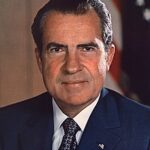The Nixon Secret Bombing Decision
President Richard Nixon authorized covert bombing campaigns against Cambodia in March 1969. The Nixon secret bombing operation targeted North Vietnamese supply routes along the Ho Chi Minh Trail. Nixon kept these attacks hidden from Congress and the American public for over a year. ⚠️ The bombing violated Cambodia’s official neutrality in the Vietnam War.
Operation Menu Begins
The secret campaign, codenamed Operation Menu, launched without congressional authorization. Nixon claimed the bombing was necessary to disrupt enemy operations. Military leaders supported the covert strikes against communist supply lines. The operation expanded far beyond its original limited scope over fourteen months.
Constitutional Violations
The Nixon secret bombing raised serious constitutional questions about presidential war powers. 📊 Congress had no knowledge of the extensive bombing campaign affecting a neutral nation. Nixon bypassed normal military reporting procedures to maintain secrecy. This decision violated both domestic law and international neutrality agreements with Cambodia.
Impact:
Domestic Political Fallout
When revealed in 1970, the secret bombing sparked massive anti-war protests nationwide. 🔥 College campuses erupted in demonstrations against Nixon’s undisclosed military actions. The Kent State shootings occurred during protests partly triggered by Cambodia revelations. Congressional leaders felt betrayed by Nixon’s secretive approach to war expansion.
International Consequences
The bombing destabilized Cambodia’s fragile neutrality during the Vietnam conflict. 🌍 Prince Sihanouk’s government faced increased pressure from all sides. Communist forces gained propaganda advantages from the unauthorized attacks. Cambodia’s eventual fall to the Khmer Rouge partly stemmed from this destabilization.
Constitutional Crisis
The Nixon secret bombing contributed to growing distrust between Congress and the executive branch. Lawmakers passed the War Powers Resolution in 1973 to limit presidential military authority. The scandal weakened Nixon’s credibility before Watergate investigations began. Supreme Court cases later addressed the limits of presidential war powers without congressional approval.
